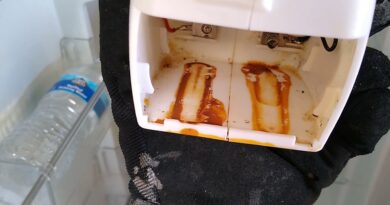HOW TO: Hook Up an RV – Connecting Your RV to Full Hook-Ups
The process to hook up an RV to full hookups at an RV park or campground isn’t too difficult, but if you’ve never done it before, this quick tutorial will get you started. Even if you’ve been RVing for years, you might pick up a quick tip or two to improve your routine.
Read more about the topic, including links to all of the products we recommend, on our blog post on the same topic (“How to Hook Up an RV: Connecting Your RV to Full Hook-Ups”):
https://www.thervgeeks.com/hook-up-an-rv/
FEATURED & RELATED PRODUCTS AVAILABLE ON AMAZON:
Slunky Sewer Hose Support: http://amzn.to/2GI1QQy
Water Pressure Regulator with Gauge: http://amzn.to/2GKmP5B
RV Dogbone Power Adapters: http://amzn.to/2DY3LPq
RECENT & RELATED VIDEOS:
Dogbone Electrical Adapters 101: http://youtu.be/wVYBei5BZmw
RV Hold Tank Dumping 1-2-3: http://youtu.be/gZFyfsy4ptw
Holding Tank Dumping & Cleaning: http://youtu.be/I6sv4d3PsTo
For example, do you spray disinfectant on your campsite’s water spigot before you connect your water hose? If not, think about one of the last things you do when disconnecting… you rinse out your sewer hose. Of course that means the RVer who used your site last night probably did the same thing. Think about that for a second, and if you don’t already keep a can of Lysol in your water compartment, you’ll probably get one pretty quick. 😉
We love boondocking (camping without RV hook-ups), taking full advantage of our ability to live comfortably off the grid for extended periods. But there’s something wonderful about taking a regular shower vs a navy shower, microwaving dinner without firing up the generator and watching TV late at night without depleting your house batteries.
These luxuries require hooking up in a campground. When it comes time to connect to water, sewer and electric, following a few standard procedures can make your stay a better one.
WONDERING WHAT’S THE BEST GEAR TO USE ON YOUR RV?
Here’s all of our favorite equipment that we use ourselves and recommend to friends:
http://thervgeeks.com/our-favorite-gear/
Join us at http://TheRVgeeks.com for more great RVing content!
Full-Time RVers since April, 2003, we share DIY (do it yourself) RV maintenance, repair, travel, upgrade and operational tips & tricks.
Many RVers are eager to learn more about using, maintaining and caring for their rigs. We hope our experience can help others go DIY, saving time & money, plus the satisfaction of a job well done.
We’re handy RVers, not professional technicians. We’re happy with the techniques and products we use, but be sure to confirm that all methods and materials you use are compatible with your equipment and abilities. Regardless of what we recommend, consult a professional if you’re unsure about working on your RV. Any task you perform or product you purchase based on any information we provide is strictly at your own risk.
We sometimes receive products for evaluation at no cost, and The RVgeeks participate in the Amazon Services LLC Associates Program, an affiliate advertising program designed to provide a means for sites to earn advertising fees by advertising and linking to Amazon.com. But our opinions are our own, you won’t pay an extra penny, and we only link to products we personally use, love and can recommend to friends with complete confidence.
Comments welcome! Thanks for watching! Don’t forget to subscribe! #HOOKUPANRV #RVHOOKUPS #RVLIFE #RVDIY #RVLIVING #FULLTIMERV #RVREPAIR #RVMAINTENANCE #RVMODS #RVUPGRADES #RVTRAVEL #DIYRV #RVGEEKS
source




Good advice!!!
Short and informative! Thank you!
Since I told my wife about the Lysol tip the first thing she does when we park is grab the can of Lysol and sprays the water bib. Next we check to make sure the water and electric work. This way if we have to move to a different site, we won't have to disconnect anything or hitch up the trailer. On time we got a site where the electricity didn't work at the pedestal. We were able to plug in at the empty site next door until it was fixed. But it would be inconvenient to have to break down camp to move to a new site if that wasn't an option.
Great video man
I heard you can't have everything running at the same time..like ac an fridge. Is that true
Before setting up your RV, leveling it, extending the slides, chocking the wheels, etc. I've heard that you should take a portable surge protector and attach it to the pedestal to make sure there are no issues with the campground wiring. If the pedestal wiring is bad, showing some type of fault you can request a different campsite that has a safe electrical system. It will save you time retracting the slides, un-leveling your rig, etc. I realize that you guys have a built in surge protector but using a portable surge protector is an added safety device. Keep up the great videos. Stanley in Md
Luv you mobile RV mobile homes that's a pretty biootch
Good job on video. I refuse to drink the water from an RV park that has not been tested. We only drink distilled (not spring) water. My wife didn't understanx until I made her a pot of coffee with distilled. I use a blue hose for fresh water and orange for black tank flush.
Always connect sewer hose to the parks sewer connection before you hook up to your RV. Just in case there’s water left in the RV dump pipe.
How do you connect the grey and black water tank when getting full hookup?
So everyone shares the same sewer drain correct ? Its not at each individual site ? Im referring to where ppl actually live in their rvs though. Not the camp sites.
I am waiting on my first RV that I have ordered and will get in Nov.
To learn about all the things that you need to know I've done most of my research on YouTube. And you two have been by far the most informative of all folks I've watched! You do such a great job explaining things clearly and precisely. Even on things that price wise are out of reach such as your new lithium battery system. I don't think my RV will cost as much as what ever that cost! LOL
Keep it up!
Thanks,
Jeff J
What is the right water pressure?
When you got full hook ups, who does it work with both the grey and black water tanks. Sounds a silly question but i am from Europe and have never been in an rv and might never get that chance.
With my grandparents on my mom's side summer time campers, I've picked up a few things from them, like with the sewer hose deal, my grandfather has told me that it is a good idea to flush the black water tank first, and then flush the grey water to flush what came out of the black water tank. I'm not sure who exactly told me this, but, I heard that it's a good idea to weigh down the end of the sewer hose that goes into the ground with something in the unlikely chance that when you go to flush your tanks, the end of the hose doesn't kick up and go all over the place. I guess it's pretty good that I've got grandparents that have been camping since the 1970s, the story there is that my grandfather was in the coast guard, but I think he had a job too, and this one time he and his family were going some where's for retreat, I forget where it was, but his boss offered him ( my grandfather) his tent trailer for time being, my grandfather initially denied his boss's offer, but his boss insisted, and he accepted, and both him (again, my grandfather) and my grandmother loved the idea, and they have kept on top of the idea of camping ever since then.
Love your videos. I'm a firm believer in sanitizing the water spicket and my water hose but I'll never use Lysol, I'll stick with bleach. I put bleach in a cub submerge the spicket then poured over the handle and pourspout. When I was four years old my next-door neighbor poisoned me with Lysol. The doctor told my mother it was only her quick thinking that save my life that day I remember it vividly, so no Lysol in my house.
I don't even have an RV..
Excellent video clip!
For a typical RV, when hooking up city water with an adjustable pressure regulator, what's the average safe water pressure in PSI that an RV can handle for camping at a full service RV park?
I've looked at numerous videos and my manual (2015 Fleetwood Bounder 34B), and all the videos start with turning off the shore power breakers..but what about the power already on the RV? Assume engine off, generator off? First time RVing and we bought our Fleetwood used so a bit naive on the setup. My plan for our first outing this weekend is to pull into the spot and deploy the slides, level the RV, shut down the engine and Generator, then proceed with the shore power connection as described in this video.
This took me forever to learn. I'm glad to see the Lysol idea. I never think about the hose last being used for the black tank. I guess it does help to have a filter though and that bacteria would be filtered out. I also don't drink my water out of the RV faucets. I buy or bring water on board from other resources.
you guys hook up at an rv park with only a house hold plug. OH NO THE BORG HAVE ALREADY ADAPTED!